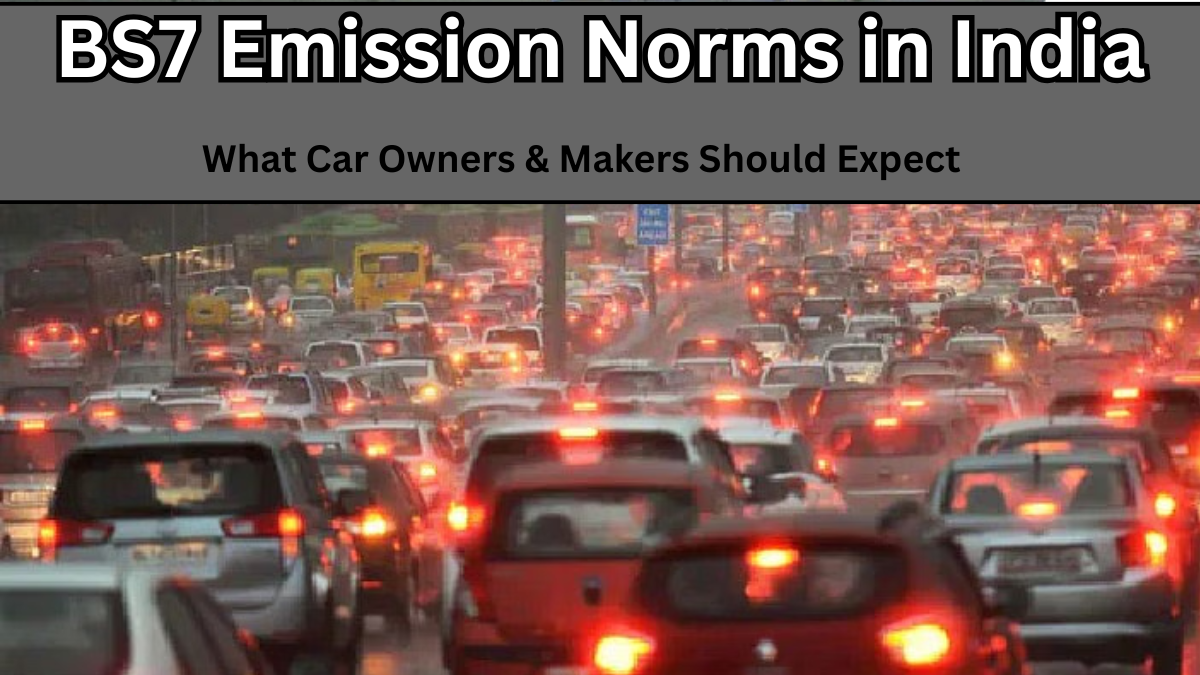India is gearing up for a cleaner, greener automotive future. After the successful implementation of BS6 norms, the next big leap — BS7 Emission Norms India 2025 — is set to transform the way we drive, produce, and think about vehicles.
Let’s break it down simply: what are BS7 norms, how they affect you as a car owner or auto manufacturer, and what’s next for vehicle compliance in India.

What Are BS7 Emission Norms?
BS7 stands for Bharat Stage 7, a set of upcoming vehicle emission regulations aligned with global standards such as Euro 7. These norms are part of India’s continuous effort to reduce air pollution and promote eco-friendly transportation.
Key Features of BS7 Norms
-
Stricter pollutant limits for NOx, CO2, and particulate matter
-
Focus on real-world testing using Portable Emissions Measurement Systems (PEMS)
-
Longer durability testing to ensure emission compliance over the vehicle’s lifecycle
-
Monitoring of non-exhaust emissions, such as brake and tyre particles
Timeline: When Will BS7 Come Into Effect?
| Milestone | Expected Date |
|---|---|
| Draft policy release | Late 2024 |
| Final framework approval | Early 2025 |
| Implementation phase begins | Mid to Late 2025 |
The target year for implementation is 2025, making BS7 Emission Norms India 2025 a critical point in India’s clean mobility roadmap.
Impact on Car Owners
If you’re planning to buy a car or already own one, here’s what BS7 means for you:
What to Expect
-
Better fuel efficiency in newer models
-
Slight increase in car prices due to advanced tech
-
More hybrid and electric options in the market
-
Stricter re-registration checks for older BS4 vehicles and below
How Manufacturers Will Be Affected
Auto companies have a lot to prepare for under BS7 norms. From research and development to infrastructure upgrades, compliance is no small feat.
Key Manufacturer Responsibilities
-
Upgrading engine technologies
-
Integrating advanced sensors for emissions tracking
-
Investing in hybrid and EV platforms
-
Ensuring full vehicle compliance with real-world driving emissions (RDE)
| Aspect | BS6 Norms | BS7 Norms |
|---|---|---|
| NOx Limit (Petrol) | 60 mg/km | Expected to be 40 mg/km or lower |
| RDE Compliance | Optional | Mandatory |
| Emission Monitoring | Lab-based | Real-world + lab |
| EV Inclusion | Indirect | Stronger push and incentives |
Why BS7 Norms Matter
India ranks among the countries with the worst air quality. Transport emissions are a huge contributor. The shift to BS7 Emission Norms India 2025 is not just about global parity — it’s about health, climate, and sustainable progress.
Vehicle Compliance Checklist for BS7
Here’s what a BS7-compliant vehicle is expected to feature:
-
Real-time emission sensors
-
Upgraded engine control units (ECUs)
-
Advanced fuel injection systems
-
Compatibility with low-sulphur fuels
-
Onboard diagnostics (OBD-3)
Challenges Ahead
Despite the benefits, challenges remain:
-
Cost burden on carmakers and consumers
-
Infrastructure gaps for PEMS and testing
-
Need for robust fuel quality across India
-
Uncertainty for smaller manufacturers
FAQs
Q1. Will BS7 norms make cars more expensive?
Yes, the cost of vehicles is likely to rise due to advanced emissions technology and compliance testing.
Q2. Will BS7 apply to existing vehicles?
No. BS7 norms will apply to new vehicles manufactured after the implementation date. However, older cars may face stricter pollution checks.
Q3. How do BS7 norms affect diesel vehicles?
Diesel vehicles will face tighter emission limits, especially for NOx and particulate matter. Manufacturers may reduce diesel offerings.
Q4. Will EVs be exempt from BS7?
EVs inherently produce zero tailpipe emissions, but BS7 will encourage more EV adoption through incentives and compliance benefits.
Final Thoughts
The BS7 Emission Norms India 2025 mark a major leap in environmental regulation. While they bring challenges for manufacturers and a slight cost hike for consumers, they’re a necessary step toward a cleaner India. If you’re planning to buy a car in the coming years, keep vehicle compliance in mind — and maybe, consider going electric.
Click here to learn more
Pari is a passionate writer known for captivating stories that blend imagination and reality. Inspired by travel, history, and everyday moments, Pari crafts narratives that resonate deeply with readers.